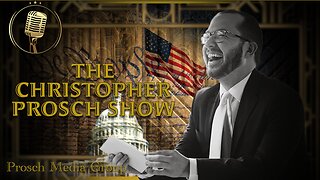Premium Only Content

Is It God Jordan Peterson Wrestles With? We Who Wrestle With God Tour Review - Nashville
Jordan Peterson believes that our particular cultural moment is not just a culture war but that something is struggling to be born. What do you think? Is there something unique about our place in history, and if something is being born, what is it?
I want to begin by talking about how we see the world through a story. Here is a quote from Jordan Peterson, “That description of the structure through which you see the world is a story…so we live in a story. Well, then as soon as you know that, this is what the postmodernists figured out, by the way, this is why the literary critics have become a dominant force in the cultural postmodernist for literary critics. And while there's nothing more irrelevant than a literary critic, who the hell cares what an intellectual thinks about a story? Of all the preposterous things to be concerned about? That might top the list? Not if your story is the things in which you see the world if the story is the thing you see through which you see the world. There's nothing more powerful than a literary critic, except perhaps, and we wouldn't have cultural war right now, If the literary critic wasn’t far more powerful than anybody had possibly imagined. Because the French intellectual literary critics known as the post modernists have criticized the central story of the West to death and that's why we have a culture war and it's no joke. This is foundational. There's no more serious conflict than that. And you all feel that that's why you're here. You know that the world is shaking and uncertain in a way that's (not) new. And the reason for that is the story itself is under assault.”
Literary critics are powerful because they make relevant stories seem irrelevant, and hard to see truths which are revealed by story, are lost on modern people.
Next we want to look at how attention is a form of worship, and ask, what is it that we should attend to? Here is another quote from Peterson, “The biblical corpus provides a multi dimensional characterization of the fundamental aim of man and cosmos. That's the claim of the book... The question being to what should we address our attention upward looking, admire and imitate? That highest possible objective of apprehension and admiration is by definition, God. It's a definition. It's the highest aim that lurks behind all proximal names. It's the upward aim as such. Alright, how do you bring that down to earth? Well, let's start with Genesis one.”
How did God bring it down? bring it down to earth in a story that corresponds to reality and perceived by the mind of God - we call this revelation)
Konstantine Kisin askes, “how do we put the toothpaste back in the tube?” In other words, how do we cure the sickness in the city? (The Republic)
Jordan Peterson answers, ““the serpent on the stake is a symbol of what's dangerous and poisonous. And what's dangerous and poisonous is an example of the danger and poison of life. The danger of life is the brute reality of mortality, our vulnerability or naked vulnerability, and the poison is malevolence. So a serpent is threat and poison. You're to confront threat and poison. The crucifix is a meta-serpent. It's everything about life that's catastrophic, and everything about life is poisonous in one symbol. And we realize in this dreamlike fashion that we're to look upon that, we're to imitate the pattern of that confrontation, which is a sacrificial pattern, and we're gonna regard that as the center of the community, which is why the cross is at the center of the church. And the church is at the center of the town, and the town is at the center of the state. It's all predicated on the idea of the ultimate sacrificial offering a voluntary acceptance of the mortal and poisonous pre-conditions of life. And that's the cure. That's the cure. And that's always been the case”
Self sacrificial, unconditional love is the third story buried beneath the first two Jordan talked about (sex and power). The self sacrificial, unconditional love of God, “The prodigal God” who spends his life lavishly with no concern for himself, only that which he loves. That’s you. The cross is the cure, because there is a man on that cross. Jordan has pointed us to the cross, but not the man, is it because he does not know the man, or is he leaving that part of the journey for another guide?
-
 42:07
42:07
BonginoReport
5 hours agoNikki Haley's Hatred of Tulsi Gabbard Just Made Me a Bigger Fan (Ep.90) - 11/21/24
78.2K179 -
 28:41
28:41
Professor Nez
10 hours ago🚨BLOOD on their HANDS! The Man Biden & Kamala Flew In Finally Faces JUSTICE for Laken Riley
37.6K24 -
 1:06:27
1:06:27
2 MIKES LIVE
3 hours agoThe Mike Schwartz Show 11-21-2024
37.1K -
 15:07
15:07
PMG
12 hours ago $0.69 earned"President Trump's Cabinet is Amazing!"
44.9K -
 LIVE
LIVE
Vigilant News Network
15 hours agoHeavily-Vaxxed County Faces Grim Reality | The Daily Dose
1,132 watching -
 1:22:22
1:22:22
Game On!
15 hours ago $11.32 earnedRussell Wilson MVP? TNF Steelers vs Browns Game of the Year!
73.7K -
 13:57
13:57
This Bahamian Gyal
16 hours agoSo, now MIKA and JOE want to work with HITLER? Sunny Hostin was right!
45.5K45 -
 59:38
59:38
The Tom Renz Show
19 hours ago"MAGA & Unity With Pastor Bernadette Smith"
29.7K2 -
 2:12
2:12
Memology 101
15 hours ago $4.06 earnedTYT's Cenk Uygur DESTROYS deluded self-proclaimed election Nostradamus over FAILED prediction "keys"
26.2K17 -
 2:11
2:11
BIG NEM
16 hours agoMeet the NATIVE Tribe Of The Balkans Nobody Talks About
33.4K5